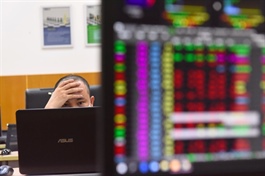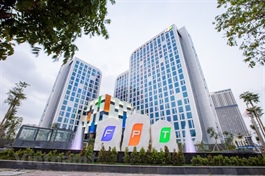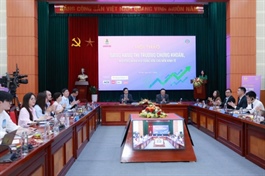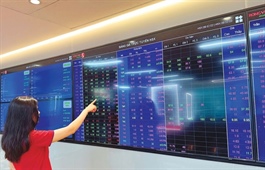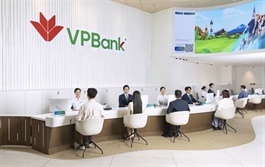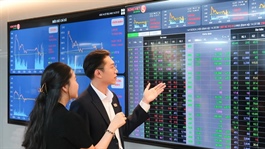Stock market now among most active
Stock market now among most active
Vietnam’s stock market has marked a quarter-century of operation with a ceremony in c, commemorating the sector’s robust development while launching a new IT system designed to underpin its next stage of growth.
Minister of Finance Nguyen Van Thang hailed the anniversary on July 28 as a pivotal moment, symbolising both legacy and forward momentum.
“Exactly a quarter of a century ago, the Ho Chi Minh Stock Exchange (now known as HSX) commenced operations and the stock market held its first trading session,” he said. “The birth of the market was a vivid and concrete outcome of the shift in mindset and the completion of the socialist-oriented market economy under the sound leadership of the Party and the state.”
The minister said that the capital market has become a lifeline of the economy and one of the three pillars of Vietnam’s financial system, alongside banking and insurance.
“Vietnam is entering a new era, an era of strong, prosperous national development. To achieve the major and comprehensive goals set by the Party and government, the financial sector, particularly the securities market, must shoulder heavy responsibilities. However, we are determined to turn challenges into motivation and contribute to the country’s socioeconomic advancement,” he added.
At the heart of the ceremony was the official rollout of the long-awaited KRX system, an advanced IT platform developed to enhance the technical foundation of Vietnam’s trading infrastructure. Launched on May 5 and managed by the HSX, the system is designed to boost trading efficiency, reduce settlement time, and support a wider range of products in line with international standards.
“Deploying the KRX system has brought transformative changes to the stock market, potentially speeding up transaction and settlement times, paving the way for new trading products, and increasing transparency and system safety,” said Nguyen Thi Viet Ha, acting chairwoman of the HSX. “It will help build investor confidence, particularly among foreign investors, and create a foundation for potential market upgrades.”
Luong Hai Sinh, chairman of the Board of Members of the Vietnam Exchange (VNX), called the event a meaningful milestone, marking both past achievements and a strategic leap forward.
“From its modest beginnings, with just two listed companies, four securities firms, and a market capitalisation equivalent to 0.28 per cent of GDP, Vietnam’s stock market has grown exponentially,” he said.
According to Sinh, by the end of June, the market boasts over 1,600 listed and registered enterprises. Combined market capitalisation of stocks and bonds now nears 100 per cent of GDP, while average daily trading value in the first half of this year surpassed $840 million.
“Vietnam now has 82 securities firms, 43 fund managers, and over 10 million investor accounts, positioning it among the most active markets in ASEAN in both capitalisation and liquidity,” he said.
Don Lam, CEO of VinaCapital, highlighted that Vietnam’s stock market has progressed significantly, especially with the successful launch of the KRX system. “It has made significant strides, particularly in establishing a modern trading platform and successfully launching the KRX system, opening up opportunities for new products in line with global trends,” he said.
Despite the momentum, Lam pointed to a lack of major new listings. “We have not seen a standout initial public offering since 2019 as a catalyst for breakthrough momentum,” he noted.
Currently, financial and real estate sectors dominate, accounting for about 60 per cent of market capitalisation. Lam called for more high-quality listings from advanced manufacturing and tech to better reflect the real structure of the economy. Drawing comparisons with markets like South Korea and Singapore, Lam said Vietnam must accelerate public listings, equitise state-owned firms, and diversify investment products.
Looking ahead, he outlined five priorities: market upgrade, financial literacy, institutional development, product diversification, and infrastructure modernisation. “A transparent capital market will be a powerful tool to help Vietnam realise its goal of becoming a developed nation by 2045,” Lam said.
As part of broader efforts to enhance market infrastructure and internationalise the capital market, the State Securities Commission (SSC) on July 21 collaborated with the Singapore Exchange (SGX) to host a seminar on depository receipts and a training programme on risk management.
“In the context of globalisation, promoting overseas public offerings and listings, particularly via depository receipts, is essential for expanding international fundraising channels, elevating the profile of Vietnamese companies, and improving global investor access,” said Vu Chi Dung, director general of International Cooperation Department at the SSC.
Nguyen Quang Thuong, deputy CEO of the VNX, noted that legal foundations are already in place. “Depository receipts for Vietnamese shares have already been issued in Thailand, and going forward, the VNX will deepen cooperation with the SGX to share best practices and co-develop such receipts for listing in Singapore,” he said.
Bernice Tan, vice president of the SGX, underscored the potential of cross-listed depository receipts to improve regional liquidity. “Cross-listed ones will leverage existing market infrastructure to create regional liquidity connectivity. This model expands opportunities for retail investors, intermediaries, and issuers alike. At the same time, such receipts will boost liquidity in both domestic and underlying markets,” she said.
On the same day, the SSC held a workshop on risk management for securities companies to bolster legal awareness and operational resilience.
SSC vice chairman Ha Duy Tung noted that the VN-Index is nearing 1,500 points, its highest in three years, and market capitalisation has reached nearly $308 billion, about 70 per cent of 2024’s GDP, with over 10.3 million investor accounts, surpassing the 2030 target.
“As Vietnam eyes emerging market status, risk management is essential for protecting investor rights and increasing market transparency,” he said.
- 14:39 05/08/2025






